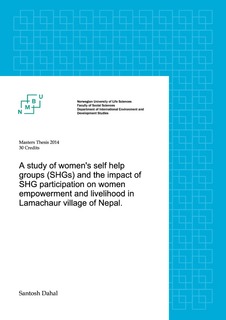| dc.description.abstract | Gender equality and women empowerment is the third of the millennium development goals (MDGs). Along with government and non government parties, a participatory community approach of the rural women known as self help groups (SHGs, also known as mother’s group or women’s group) are working towards achieving the goal. In rural parts of Nepal, such groups are carrying out various activities that benefit women and community. The objective of this thesis is to study these activities and their impact upon the community. This study also attempts to access the impact of SHG participation upon various empowerment indicators (i.e. social, economic, political and psychological). A survey of 80 respondents (40 participants and 40 non participants) was conducted in a small rural village of Nepal. 3 in-depth interviews, 2 focus group discussions and 3 key informant interviews are carried out to retrieve data. Regression and t-tests are used to analyze quantitative data and comparison, contrast and explanation are used to analyze the qualitative data.
The result showed that SHGs in Nepal carry out various activities like awareness campaigns, social control activities like controlling alcoholism, betting and gambling, advocating for poor and voiceless women, campaigning against discrimination and superstitious beliefs, providing skill based trainings to members of SHGs etc. The study also showed that members of SHGs had higher empowerment indicators and higher income and assets. The study found that women empowerment is positively impacted by self help groups. The various activities like rural microcredit reduced the economic dependency of women upon other members of the family and the trainings and knowledge enabled the women to begin economic activities. Thus, women could use the fusion of loan and trainings to improve their livelihood by diversifying their income sources and reducing dependency. The meetings and awareness programs increased the knowledge and experience which led to an increase in the ability of making quality decisions and ensure participation. Participating in the social control activities, women were able to gradually lower the traditional and cultural barriers for participating in the development process. The higher empowerment indicators of the SHG participants as seen in the study suggest that participation speeds up the empowerment process. It will be too early and immature to conclude that SHG participation contributes to increase high value assets. Thus, a detailed time series study is required to make a valid conclusion on SHG effects on assets acquisition. | nb_NO |
